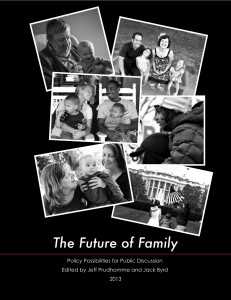The Future of Family, a discussion guidebook from the Interactivity Foundation (IF), examines possibilities for public policy on family life distilled from a series of small-group discussions that wrestled with a wide range of questions and concerns for the future of family, including—
- In a culturally diverse society, what roles should cultural heritage play in policy decisions about the family? Different cultures have different ideas about how families are formed, how big they should be, and the roles people have within them.
- How should we address our changing ideas about gender roles and of human sexuality? How might public policy for the family take these into account?
- As we face an increasingly aging or mobile population, what concerns might arise for families?
- What about the economic concerns facing families?
 Edited by IF Fellow Jeff Prudhomme and the Interactivity Foundation’s president Jack Byrd, Jr., this guidebook asks readers to consider how public policy might respond to these concerns. It invites readers to explore and discuss what values or moral considerations shape these policies? What are the rights and responsibilities in regard to the family that public policy should take into account? How should we approach the relationship between political power and the family? What are other moral, legal, or political concerns that our family policies might need to address?
Edited by IF Fellow Jeff Prudhomme and the Interactivity Foundation’s president Jack Byrd, Jr., this guidebook asks readers to consider how public policy might respond to these concerns. It invites readers to explore and discuss what values or moral considerations shape these policies? What are the rights and responsibilities in regard to the family that public policy should take into account? How should we approach the relationship between political power and the family? What are other moral, legal, or political concerns that our family policies might need to address?
For further exploration and discussion, the guidebook presents nine contrasting policy possibilities for the future of family:
- Charter Whatever Family You Want
- Reinforce the Traditional Nuclear Family
- The Bigger the Better: Support Extended Families
- Families are Safe Harbors
- The Family as a School for Democracy
- Break up Aristocracies for a More Democratic Society
- The Family is Number One
- Manage the Family for the Greater Good
- Focus on the Basic Principles for Each Family Situation
For each of these possibilities, the discussion guidebook also describes possible implementations, effects (or consequences), and further discussion questions.
The Interactivity Foundation is a non-profit, non-partisan organization that works to enhance the process and expand the scope of our public discussions through facilitated small-group discussion of multiple and contrasting possibilities. The Foundation does not engage in political advocacy for itself, any other organization or group, or on behalf of any of the policy possibilities described in its discussion guidebooks. For more information, see the Foundation’s website at www.interactivityfoundation.org.
Resource Link: www.interactivityfoundation.org/new-discussion-guidebook-future-family






